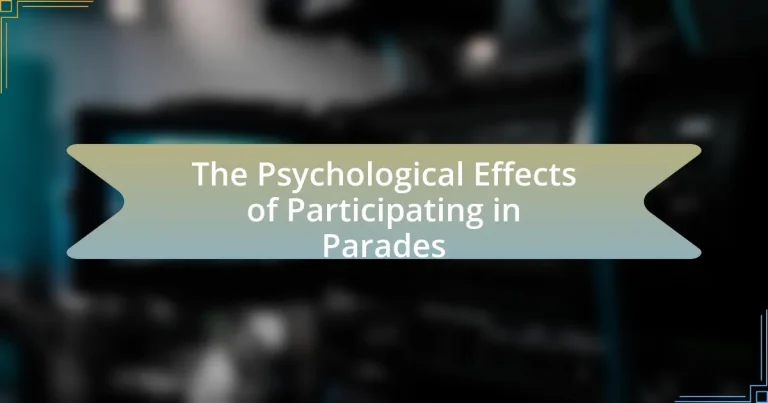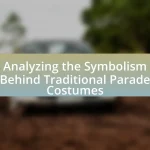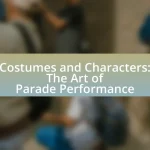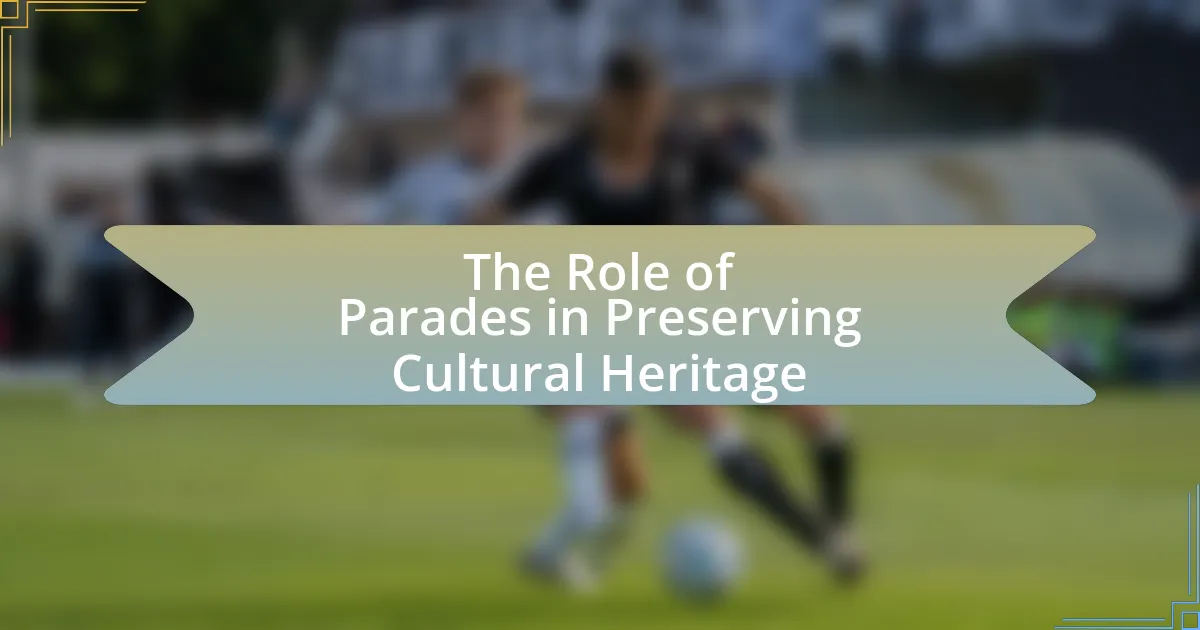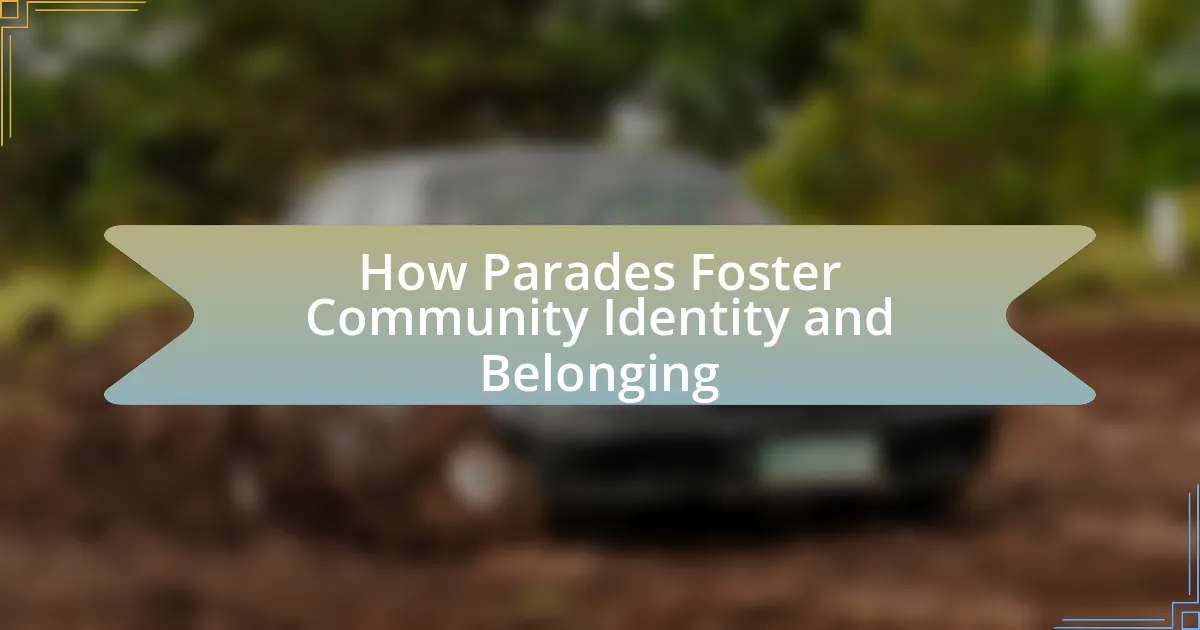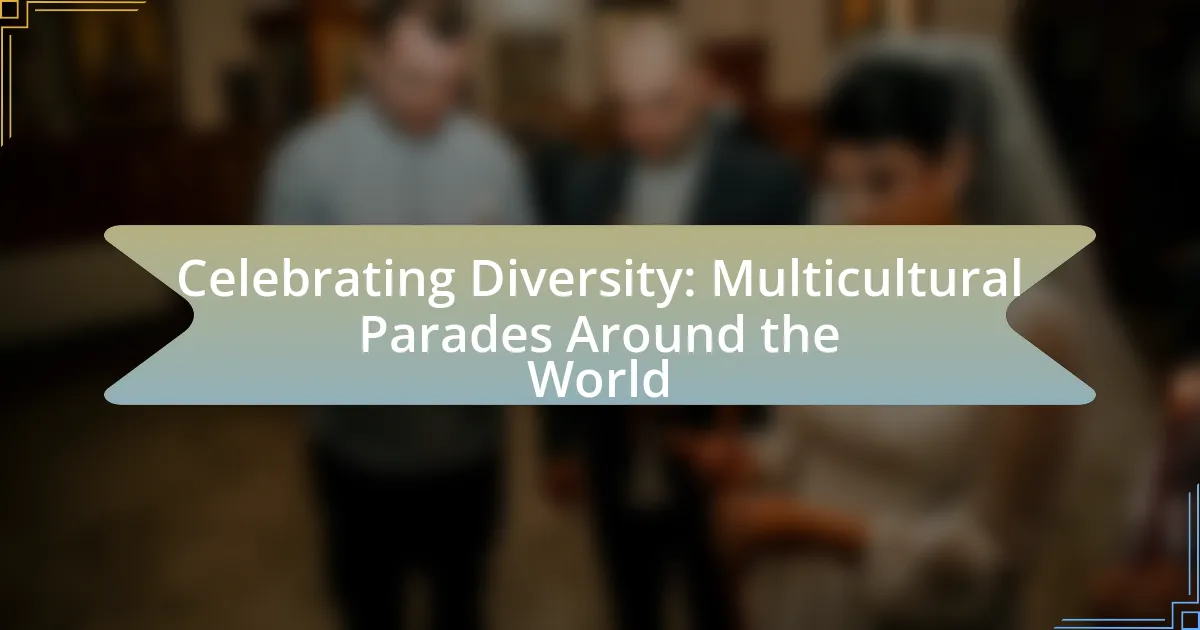The article examines the psychological effects of participating in parades, highlighting their positive impact on mental well-being. It discusses how parades foster a sense of community, enhance mood, and reduce stress levels through social connections and shared experiences. Key findings indicate that participation can lead to increased feelings of belonging, improved self-esteem, and emotional expression, while also serving as a form of stress relief. The article further explores the role of individual personality traits, cultural significance, and the type of parade in shaping participants’ experiences and psychological outcomes.
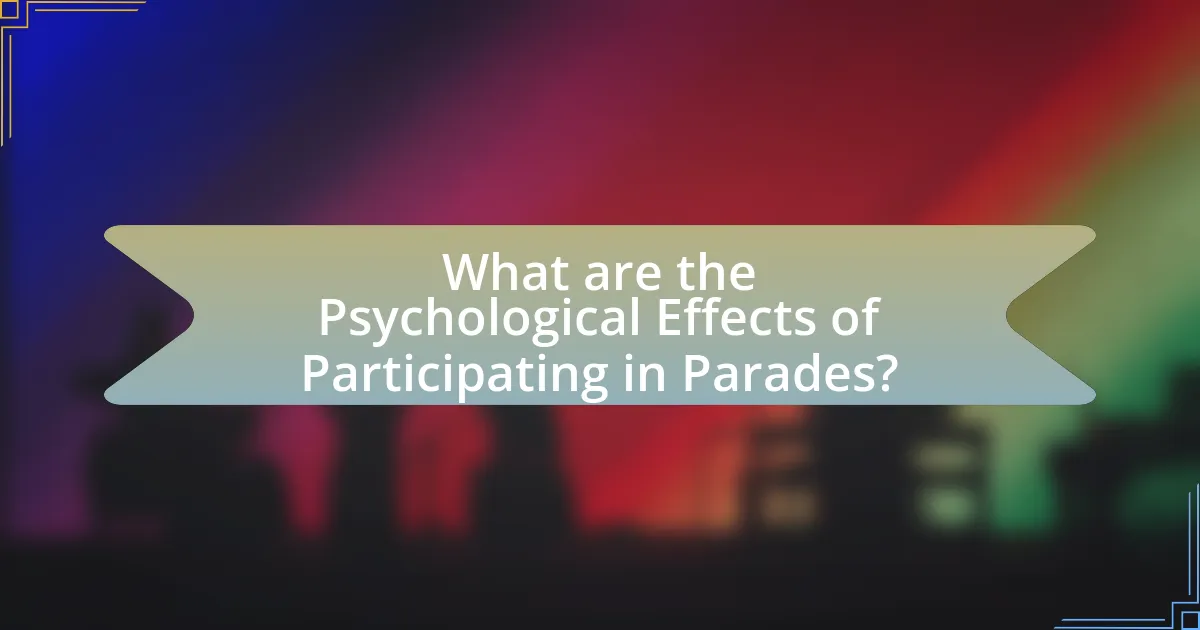
What are the Psychological Effects of Participating in Parades?
Participating in parades can lead to positive psychological effects, including increased feelings of community, enhanced mood, and reduced stress levels. The collective experience of celebration fosters social connections and a sense of belonging, which are crucial for mental well-being. Research indicates that engaging in communal activities like parades can elevate serotonin levels, contributing to improved emotional states. Additionally, the vibrant atmosphere and shared joy during parades can serve as a form of stress relief, allowing participants to temporarily escape daily pressures. Studies have shown that such social interactions can significantly lower anxiety and depression rates, reinforcing the mental health benefits of participating in these events.
How do parades influence individual mental health?
Parades positively influence individual mental health by fostering a sense of community and belonging. Participation in parades often leads to increased social interaction, which can reduce feelings of loneliness and depression. Research indicates that engaging in communal activities, such as parades, can elevate mood and enhance overall well-being. For instance, a study published in the Journal of Community Psychology found that individuals who participate in community events report higher levels of life satisfaction and lower levels of anxiety. This connection to others during parades can also stimulate the release of endorphins, further contributing to improved mental health outcomes.
What specific emotions are commonly experienced during parades?
Common emotions experienced during parades include joy, excitement, pride, and community connection. Participants and spectators often feel joy and excitement due to the festive atmosphere, characterized by music, colorful displays, and celebratory activities. Pride is frequently felt, especially in parades celebrating cultural heritage or significant events, as individuals take pride in their identity and community. Additionally, a sense of community connection arises as people come together, fostering social bonds and shared experiences. These emotions are supported by psychological studies indicating that communal events like parades enhance feelings of belonging and happiness among participants.
How does participation in parades affect stress levels?
Participation in parades generally reduces stress levels. Engaging in communal activities like parades fosters social connections, which can enhance feelings of belonging and support, thereby alleviating stress. Research indicates that social participation is linked to lower levels of anxiety and depression, as seen in studies that highlight the positive psychological impacts of community events. For instance, a study published in the Journal of Community Psychology found that individuals who participate in community events report higher life satisfaction and lower stress levels compared to those who do not engage in such activities.
What social psychological impacts arise from parade participation?
Parade participation fosters a sense of community and belonging among individuals, enhancing social cohesion. This collective experience can lead to increased feelings of happiness and well-being, as participants engage in shared rituals and celebrations. Research indicates that such communal activities can boost self-esteem and promote prosocial behavior, as individuals feel more connected to others and more willing to help within their community. Additionally, the excitement and energy of parades can trigger positive emotional responses, reinforcing social bonds and group identity.
How does group identity play a role in the parade experience?
Group identity significantly enhances the parade experience by fostering a sense of belonging and collective pride among participants. When individuals identify with a specific group, such as a cultural, social, or community organization, they often experience heightened emotional engagement during the parade, which can lead to increased enjoyment and satisfaction. Research indicates that shared group identity can amplify feelings of solidarity and connection, as seen in studies like “The Role of Group Identity in Collective Action” by Simon et al., which highlights how group dynamics influence individual behaviors and emotional responses in social settings. This collective experience not only strengthens interpersonal bonds but also reinforces cultural narratives and community values, making the parade a powerful expression of group identity.
What is the significance of community bonding during parades?
Community bonding during parades is significant as it fosters social cohesion and collective identity among participants. This shared experience enhances feelings of belonging and mutual support, which are crucial for community resilience. Research indicates that communal activities, such as parades, promote interpersonal connections and strengthen social networks, leading to improved mental well-being and community engagement. For instance, a study published in the Journal of Community Psychology found that participation in community events like parades significantly increases social capital, which is essential for community development and individual psychological health.
Why do people choose to participate in parades?
People choose to participate in parades primarily for social connection and community engagement. Participation fosters a sense of belonging and collective identity, as individuals often join with friends, family, or local groups to celebrate shared values or cultural heritage. Research indicates that communal activities like parades can enhance social bonds and improve mental well-being by providing opportunities for positive social interactions and emotional expression. For instance, a study published in the Journal of Community Psychology found that community events, including parades, significantly contribute to increased feelings of happiness and social cohesion among participants.
What motivations drive individuals to join parades?
Individuals are motivated to join parades primarily for social connection, self-expression, and cultural celebration. Social connection is evident as parades often foster a sense of community and belonging among participants, allowing them to engage with others who share similar interests or identities. Self-expression is another key motivation, as individuals use parades as a platform to showcase their beliefs, creativity, and personal identity, often through costumes or performances. Cultural celebration is also significant, as parades serve to honor traditions, heritage, and significant events, reinforcing cultural identity and pride. Research indicates that participation in such communal activities can enhance psychological well-being by promoting feelings of happiness and reducing stress, thereby validating these motivations.
How do cultural factors influence parade participation?
Cultural factors significantly influence parade participation by shaping individuals’ motivations, values, and social norms related to communal celebrations. For instance, in cultures where parades are integral to identity and heritage, such as Mardi Gras in New Orleans, participation is often seen as a rite of passage and a means of expressing cultural pride. Research indicates that cultural traditions and community ties enhance the likelihood of participation, as individuals feel a sense of belonging and obligation to uphold these practices. Additionally, cultural narratives surrounding parades can foster emotional connections, encouraging attendance and active involvement.
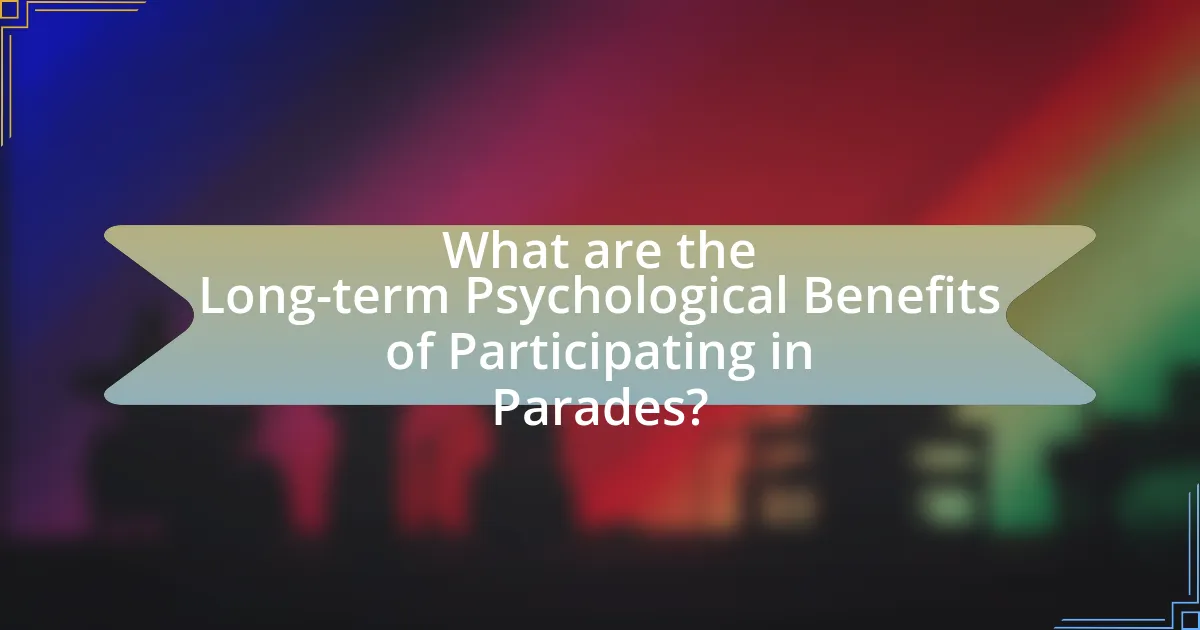
What are the Long-term Psychological Benefits of Participating in Parades?
Participating in parades offers long-term psychological benefits such as enhanced community belonging, increased self-esteem, and improved emotional well-being. Engaging in these social events fosters a sense of connection with others, which can lead to lasting friendships and a supportive network. Research indicates that social participation, like that found in parades, is linked to lower levels of depression and anxiety, as individuals feel more integrated into their communities. Additionally, the act of performing or showcasing talents during parades can boost self-confidence, contributing to a positive self-image over time. Studies have shown that individuals who regularly engage in community activities report higher life satisfaction and overall happiness, reinforcing the psychological advantages of participating in parades.
How can participating in parades enhance self-esteem?
Participating in parades can enhance self-esteem by providing individuals with a sense of belonging and accomplishment. When people engage in parades, they often experience social validation through community support and recognition, which can boost their confidence. Research indicates that social participation, such as joining parades, fosters positive self-perception and enhances feelings of worthiness. For instance, a study published in the Journal of Community Psychology found that group activities, including parades, significantly improve self-esteem by creating a shared identity and reinforcing social bonds among participants.
What role does public performance play in boosting confidence?
Public performance significantly boosts confidence by providing individuals with opportunities to confront and overcome their fears of judgment and failure. Engaging in public performance, such as participating in parades, allows individuals to practice self-expression in a supportive environment, which can lead to increased self-esteem and a sense of accomplishment. Research indicates that repeated exposure to public speaking or performance situations can reduce anxiety and enhance self-efficacy, as demonstrated in studies showing that individuals who regularly engage in public performances report higher levels of confidence and lower levels of social anxiety.
How does recognition in parades contribute to personal growth?
Recognition in parades contributes to personal growth by enhancing self-esteem and fostering a sense of belonging. When individuals receive acknowledgment for their participation, it validates their efforts and achievements, leading to increased confidence. Studies show that social recognition, such as that experienced in parades, can significantly boost an individual’s self-worth and motivation, as evidenced by research published in the Journal of Personality and Social Psychology, which highlights the positive correlation between social recognition and psychological well-being. This validation encourages individuals to engage more actively in their communities, further promoting personal development and social skills.
What are the potential therapeutic effects of parade participation?
Parade participation can lead to several therapeutic effects, including enhanced social connection, improved mood, and reduced stress levels. Engaging in parades fosters a sense of community and belonging, which can alleviate feelings of isolation and loneliness. Research indicates that social interactions during such events can trigger the release of endorphins, contributing to a more positive emotional state. Additionally, the physical activity involved in participating, such as walking or dancing, can further enhance mental well-being by promoting physical health and reducing anxiety. Studies have shown that community events like parades can significantly lower cortisol levels, a hormone associated with stress, thereby promoting relaxation and overall psychological health.
How can parades serve as a form of emotional release?
Parades can serve as a form of emotional release by providing participants and spectators an opportunity to express joy, excitement, and community spirit. The collective experience of celebration during parades often leads to the release of pent-up emotions, as individuals engage in dancing, cheering, and socializing. Research indicates that such communal activities can enhance feelings of belonging and reduce stress, as seen in studies highlighting the positive psychological effects of group participation in festive events. For instance, a study published in the Journal of Community Psychology found that participation in community events like parades significantly improved participants’ mood and overall emotional well-being.
What evidence supports the mental health benefits of community events like parades?
Community events like parades provide significant mental health benefits, supported by various studies indicating increased social cohesion and reduced feelings of isolation. Research published in the Journal of Community Psychology highlights that participation in communal activities fosters a sense of belonging, which is crucial for mental well-being. Additionally, a study by the University of California found that individuals who engage in community events report lower levels of anxiety and depression, attributing this to the positive social interactions and shared experiences that parades facilitate. These findings underscore the importance of community events in enhancing mental health through social engagement and collective joy.
How do parades foster resilience among participants?
Parades foster resilience among participants by creating a sense of community and shared purpose, which enhances emotional support and coping mechanisms. The collective experience of participating in a parade allows individuals to bond over common goals, reducing feelings of isolation and promoting social connections. Research indicates that social support is a critical factor in building resilience, as it helps individuals navigate challenges more effectively. For instance, a study published in the Journal of Community Psychology found that community events, such as parades, significantly improve participants’ mental well-being by fostering social ties and a sense of belonging. This supportive environment encourages individuals to face adversities with greater strength and adaptability.
What coping strategies are developed through parade involvement?
Parade involvement fosters several coping strategies, including social support, emotional expression, and stress relief. Participants often build strong social networks, which provide emotional backing during challenging times. Engaging in parades allows individuals to express their feelings and creativity, contributing to emotional well-being. Additionally, the festive atmosphere and physical activity associated with parades serve as effective stress relievers, promoting mental health. Research indicates that such communal activities can enhance resilience and coping mechanisms, as seen in studies highlighting the positive psychological impacts of community engagement.
How does overcoming challenges in parades build psychological strength?
Overcoming challenges in parades builds psychological strength by fostering resilience and enhancing coping skills. Participants face various obstacles, such as inclement weather, logistical issues, or performance anxiety, which require them to adapt and persevere. This process of confronting and managing difficulties contributes to a greater sense of self-efficacy and emotional regulation. Research indicates that engaging in challenging activities can lead to improved mental health outcomes, as individuals learn to navigate stressors effectively, thereby reinforcing their psychological fortitude.
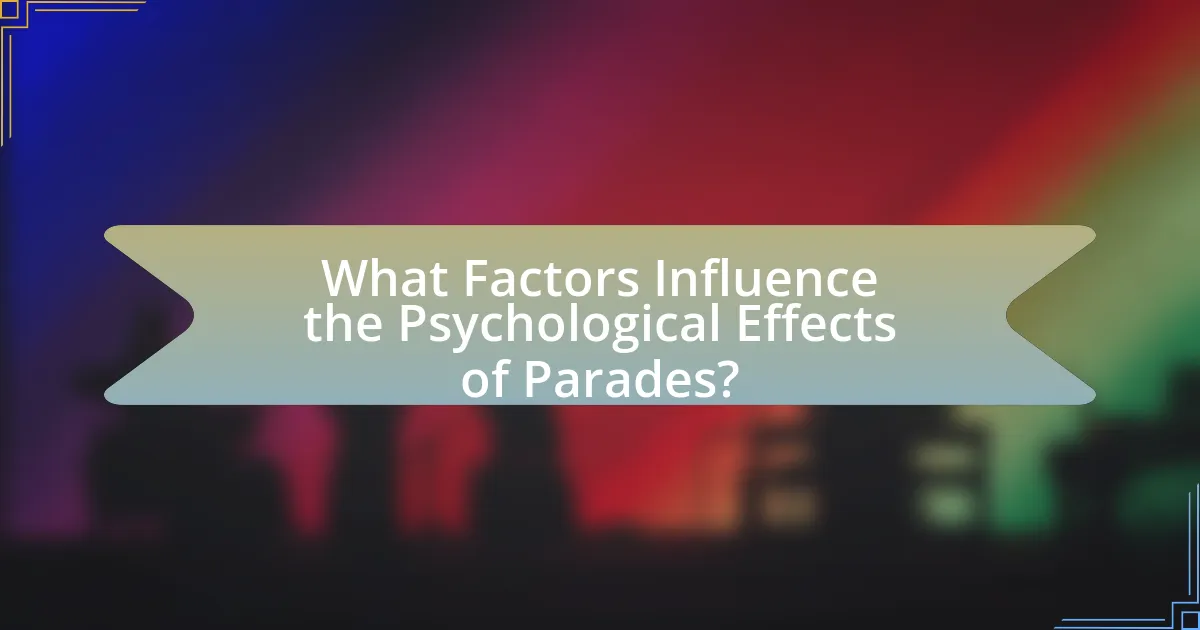
What Factors Influence the Psychological Effects of Parades?
The psychological effects of parades are influenced by factors such as social identity, community engagement, emotional expression, and cultural significance. Social identity plays a crucial role as individuals often feel a sense of belonging and pride when participating in parades that represent their community or culture. Community engagement enhances feelings of connection and support among participants, leading to positive emotional experiences. Emotional expression is facilitated through the celebration and shared joy during parades, which can elevate mood and foster a sense of happiness. Additionally, the cultural significance of parades, often tied to historical events or traditions, can evoke strong emotional responses and reinforce group cohesion. These factors collectively contribute to the overall psychological impact of participating in parades.
How does the type of parade affect participants’ experiences?
The type of parade significantly influences participants’ experiences by shaping their emotional engagement and social interactions. For instance, festive parades, such as Mardi Gras, often elicit feelings of joy and excitement due to vibrant displays and communal celebrations, fostering a sense of belonging among participants. In contrast, solemn parades, like memorial services, evoke reflective emotions and a sense of reverence, impacting how individuals process their experiences. Research indicates that the emotional tone of a parade can enhance participants’ psychological well-being; a study published in the Journal of Community Psychology found that participants in celebratory parades reported higher levels of happiness and social connectedness compared to those in more somber events. Thus, the type of parade directly correlates with the emotional and social experiences of its participants.
What differences exist between cultural, festive, and protest parades?
Cultural, festive, and protest parades differ primarily in their purpose and expression. Cultural parades celebrate specific traditions, heritage, or identity, often showcasing art, music, and dance that reflect the community’s values. For example, the Chinese New Year Parade highlights Chinese culture through dragon dances and traditional costumes. Festive parades, such as Mardi Gras, focus on celebration and entertainment, featuring floats, music, and revelry to create a joyful atmosphere. In contrast, protest parades aim to raise awareness or advocate for social or political change, often characterized by slogans, banners, and a collective call for action, as seen in events like the Women’s March. Each type of parade serves distinct psychological effects, influencing participants’ sense of belonging, community engagement, and emotional expression.
How do the scale and organization of a parade impact psychological outcomes?
The scale and organization of a parade significantly influence psychological outcomes by affecting participants’ feelings of community, belonging, and emotional well-being. Larger parades tend to create a heightened sense of excitement and collective joy, as evidenced by studies showing that participation in large-scale events can lead to increased levels of happiness and reduced feelings of isolation. For instance, research published in the Journal of Community Psychology indicates that organized community events foster social connections, which are crucial for mental health. Additionally, well-organized parades can enhance feelings of safety and enjoyment, leading to positive emotional experiences among attendees. Conversely, poorly organized parades may result in stress and anxiety, negatively impacting psychological well-being.
What role does individual personality play in the parade experience?
Individual personality significantly influences the parade experience by shaping emotional responses and engagement levels. For instance, extroverted individuals often experience heightened excitement and social interaction during parades, leading to greater enjoyment and participation. Conversely, introverted personalities may feel overwhelmed by the crowds and noise, resulting in a more subdued experience. Research indicates that personality traits, such as openness and conscientiousness, correlate with how individuals perceive and engage in social events like parades, affecting their overall satisfaction and emotional well-being during the event.
How do introverted and extroverted individuals respond differently to parades?
Introverted individuals typically respond to parades with a preference for observation and limited social interaction, while extroverted individuals often engage actively and seek social connections. Introverts may feel overwhelmed by the crowds and noise, leading them to enjoy parades from a distance or in quieter areas, as they recharge through solitude. In contrast, extroverts thrive in the vibrant atmosphere, finding excitement in the social interactions and communal experiences that parades offer. Research indicates that personality traits significantly influence social behavior, with extroverts demonstrating higher levels of engagement in group activities compared to introverts, who may prioritize personal space and reflection in such settings.
What psychological traits enhance the enjoyment of parade participation?
Psychological traits that enhance the enjoyment of parade participation include extroversion, openness to experience, and a sense of community. Extroverted individuals typically thrive in social settings, finding joy in the interaction and energy of a parade atmosphere. Openness to experience allows participants to appreciate the creativity and diversity of parade floats and performances, enhancing their overall enjoyment. Additionally, a strong sense of community fosters connection and belonging, which can amplify the positive emotions associated with participating in such events. Research indicates that these traits contribute to increased satisfaction and engagement in communal activities, such as parades, by facilitating social interactions and enhancing the overall experience.
What practical tips can enhance the psychological benefits of participating in parades?
Participating in parades can enhance psychological benefits through social engagement, active involvement, and positive emotional expression. Engaging with others fosters a sense of community, which has been shown to improve mental well-being by reducing feelings of isolation. Actively participating, whether through volunteering or performing, can boost self-esteem and provide a sense of accomplishment, as evidenced by studies indicating that involvement in community activities correlates with higher life satisfaction. Additionally, expressing joy and excitement during parades can trigger the release of endorphins, further enhancing mood and reducing stress levels.
How can participants prepare mentally for a parade experience?
Participants can prepare mentally for a parade experience by engaging in visualization techniques, practicing mindfulness, and setting realistic expectations. Visualization involves imagining the parade scenario, which can enhance confidence and reduce anxiety by familiarizing participants with the environment and their role. Mindfulness practices, such as deep breathing and meditation, help participants stay present and manage stress, contributing to a more enjoyable experience. Setting realistic expectations allows participants to focus on the enjoyment of the event rather than perfection, which can alleviate pressure and enhance overall satisfaction. These methods are supported by psychological research indicating that mental preparation can significantly improve performance and emotional well-being in high-stress situations.
What strategies can individuals use to maximize enjoyment and connection during parades?
Individuals can maximize enjoyment and connection during parades by actively engaging with the event, such as participating in group activities, interacting with performers, and sharing the experience with friends or family. Engaging in group activities fosters a sense of community, as studies show that shared experiences enhance emotional connections among participants. Interacting with performers, such as dancers or musicians, can create memorable moments that deepen the emotional impact of the event. Additionally, sharing the experience with loved ones amplifies enjoyment, as social interactions are linked to increased happiness and satisfaction during communal events.
